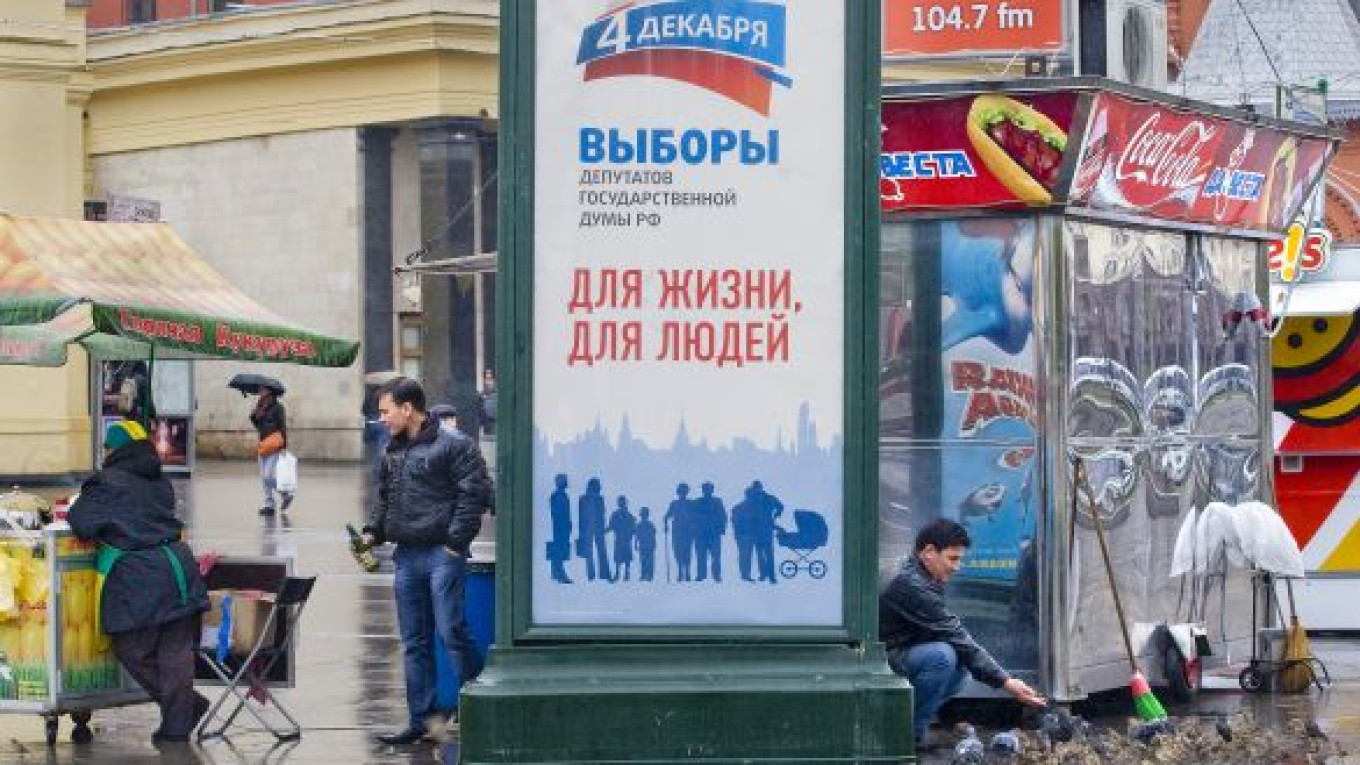Communist leader Gennady Zyuganov has mounted a direct challenge to the nationalist-minded Liberal Democratic Party, declaring that his party would court the nationalist vote in the State Duma elections.
Zyuganov also called for a return of the Soviet-era nationality status in internal passports, infamously used to discriminate against and persecute Soviet citizens of Jewish heritage.
Zyuganov's remarks, made during a Duma roundtable on the status of ethnic Russians living in the country, appeared to be an attempt to prop up support as the party's traditional constituency, pensioners, die.
But a former member of Zyuganov's inner circle expressed doubt that the Communist leader's rhetoric would translate into votes.
"He still has to rely on the old ladies who work on the election campaign trail," Alexei Podberezkin, who worked as a senior political strategist for the party, said Tuesday by telephone.
He described Zyuganov as "essentially a social-democrat" who in reality had little passion for the nationalist agenda spouted by the Liberal Democratic Party and, occasionally, by the left-leaning, socialist-minded A Just Russia.
Zyuganov sounded quite a different note at the roundtable.
"Russians today are the most humbled and divided nation in the world. The solution as we see it is to unite around a Russian national idea and social justice," Zyuganov said Monday, RIA-Novosti reported.
Zyuganov said ethnic Russians should be recognized in the Constitution as the founders of the Russian state, and he said his party wants to return the line to passports that define a person's nationality. The line appeared in Soviet and Russian passports but was abolished in 1997. The Communists tried to draft legislation to bring back the line in 2002, but the proposal was rejected by the pro-government majority.
"People want to be proud of their nationality, and I don't see any problem regarding that fact," Sergei Obukhov, a senior Communist official, told The Moscow Times.
He said the idea was supported by many ethnic Russians and also by people living in republics with large ethnic groups. He said the nationality line might be included in each passport on a "voluntarily" basis.
Some Communist leaders in regions with diverse ethnic groups also welcomed the proposal. "We live in a multinational region, but many people understand that Russians comprise the majority of this country," Yury Dzagania, head of the Communist branch in Sochi, said by telephone from the Black Sea resort in the Krasnodar region.
"The Russian people unite other peoples, too," he added.
He also applauded the proposed constitutional amendment recognizing the status of ethnic Russians. "This would allow ethnic Russians to create their own national organizations similar to the national organizations of other ethnic groups," he said.
A Duma deputy with the Liberal Democratic Party accused the Communists of trying to steal his party's votes and predicted they would fail.
"The Communists always do things that are good for them and bad for the people," Deputy Yaroslav Nilyov said by phone. "The Communists are trying to copy the agenda that we have pursued for 20 years."
The Communists have support of about 13 percent of the population, according to a recent survey by the independent Levada Center pollster. The party won 11.57 percent of the vote in the 2007 Duma elections.
The Communist Party has toyed with a nationalist agenda since the 1990s, when it cooperated with nationalist parties to fight President Boris Yeltsin's reforms.
In 2005, during Vladimir Putin's second presidential term, Communist Duma Deputies Albert Makashov and Nikolai Kondratenko appealed to the prosecutor general to ban Jewish groups that they considered extremist.
Nationalist sentiments are growing, with 5,000 nationalists and football fans rioting on Moscow's Manezh Square in December and nationalist violence erupting in the Sverdlovsk region town of Sagra earlier this year, among other examples.
"The authorities can't close their eyes to nationality issues," Dzagania said from Sochi. "We see that the events in Sagra and on the Manezh are connected with the issue of nationality."
Forty-three percent of Russians support that slogan "Russia for Russians," according to a Lavada? survey? in January 2011, up from 36 percent in 2009.
Sergei Udaltsov, leader of the Left Front group and a Communist critic, said nationalist tensions were "a reaction to the authorities' deeds," and Zyuganov's nationalist rhetoric could be dangerous. "The party is tailing the nationalist groups, but it could be swept away by this wave," he said.
Zyuganov's remarks met a mixed response of the party's web site, with some saying they opposed the party's leftist values. "What about the principles of internationalism?" reader David Mendel wrote.
But another reader, Andrei Aseichev, has welcomed the party's turn to the nationalism. "The Russian problem is a big one, and it is good that Zyuganov wants to deal with it," he said.
A Message from The Moscow Times:
Dear readers,
We are facing unprecedented challenges. Russia's Prosecutor General's Office has designated The Moscow Times as an "undesirable" organization, criminalizing our work and putting our staff at risk of prosecution. This follows our earlier unjust labeling as a "foreign agent."
These actions are direct attempts to silence independent journalism in Russia. The authorities claim our work "discredits the decisions of the Russian leadership." We see things differently: we strive to provide accurate, unbiased reporting on Russia.
We, the journalists of The Moscow Times, refuse to be silenced. But to continue our work, we need your help.
Your support, no matter how small, makes a world of difference. If you can, please support us monthly starting from just $2. It's quick to set up, and every contribution makes a significant impact.
By supporting The Moscow Times, you're defending open, independent journalism in the face of repression. Thank you for standing with us.
Remind me later.


